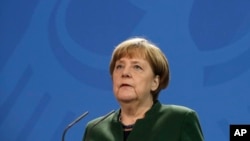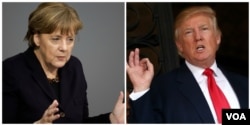Angela Merkel’s aides jokingly explain the German chancellor’s improving poll ratings as due to "the Trump factor."
With a federal election barely eight months away, the German leader is bouncing back from the low approval ratings she was getting during the height of the refugee crisis in the winter of 2015-16. And her advisers think they have the new U.S. president in part to thank for the bounce.
Pollster Forschungsgruppe Wahlen has Merkel’s approval rating now at 74 percent, which is much higher than any of her peers in Europe. U.S. President Donald Trump’s approval rating in the United States stands at 42 percent in the latest Gallup poll.
Trump and his aides have not held back in criticizing the chancellor. During his election campaign, Trump repeatedly criticized Merkel for admitting into Germany war refugees from Middle Eastern nations, blaming her for what he said would be the wrecking of her country, although on occasion he pulled back and described her as his favorite world leader.
A year ago, Trump predicted, "The German people are going to end up overthrowing this woman. I don't know what the hell she's thinking." In a March 2016 interview with The New York Times, he said, “Germany's being destroyed. I have friends, I just left people from Germany and they don't even want to go back. Germany's being destroyed by Merkel's naïveté or worse.”
And days before his inauguration earlier this month, Trump told The Times of London and Germany’s Bild newspaper that Merkel's decision to allow more than a million migrants into Germany had been a “catastrophic mistake.” His views mirror the attack lines of the "America First" website Breitbart News, which until recently was run by key Trump aide, Steve Bannon.
High approval rating
Forecasts of her imminent downfall, however, appear to be having the opposite effect in Germany.
Nearly 60 percent of Germans, according to recent polls, now feel their country can cope with the refugees. That may be in part because refugee numbers have fallen from 890,000 in 2015 to 280,000 last year.
“The initial shock of the refugee impact is starting to wear off,” a Merkel aide told VOA. As she starts her election campaign hoping to secure a fourth term as chancellor, Merkel and her aides are already using Trump as a foil, although the chancellor herself has avoided too much overt criticism of Trump, leaving the sharper attacks to others in the German government.
Merkel’s aides note she has enjoyed rising approval ratings since last June’s vote by Britons to leave the European Union.
Within days of the British vote, known as Brexit, Merkel’s popularity rose by 9 percent, according to a poll conducted for Germany’s ARD television, to record her best showing since September the previous year, when her numbers were dipping fast and the talk in Berlin was of the chancellor’s fast approaching political demise.
Analysts say probably the best explanation for her growing popular support are signs, across many western European countries, of increased backing for the European Union amid fears of instability.
Europeans see leaving the regional grouping as a “big gamble,” she said last year. “Nobody wants to put themselves in the kind of mess the British have created for themselves,” she added.
Far from riding Brexit and Trump waves, Germany’s populist nationalist party AfD, backed loudly by Breitbart News, has been stuck in the polls at about 12 percent. The terror attack in Berlin in December, when a Tunisian refugee rammed a truck through a Christmas market killing a dozen, didn’t improve AfD’s political fortunes.
Opposition
Faced by a strengthened chancellor, Germany’s Social Democrats, reluctant members of Merkel’s grand governing coalition, have turned to Martin Schulz, the former president of the European Parliament, to run against Merkel and her center-right bloc in the September 24 federal election. The Social Democrats hope Schulz’s tenure in Brussels means he will be in a better position to criticize the chancellor than others in the party who have had to work with her.
Few, however, believe Schulz will be able to topple Germany’s so-called Iron Lady. Analyst Josef Janning, in a commentary for the European Council on Foreign Relations, describes Merkel as “seemingly unassailable” and says Schulz’s “chances of landing a knockout blow in this duel are slim.”





